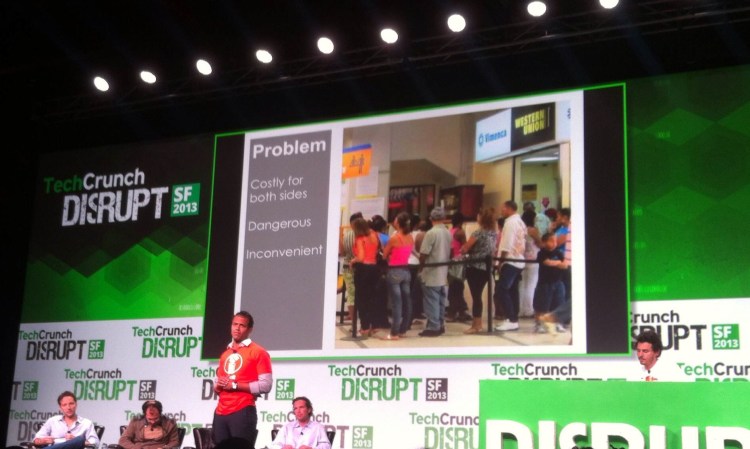Regalii
Regalli is “revolutionizing remittances” for families in Latin America. The company lets immigrants send money directly back to their families via SMS.
Cofounder Edrizio De La Cruz said that $69 billion in remittances are sent to Latin America every single year. This money is a vital source if income for many families in the developing world. De La Cruz said he sends money back home every single month that helps his family keep the lights on and put food on the table.
This money is commonly sent through Western Union, which heavily taxes these transactions and requires people in rural areas to make lengthy commutes to a Western Union office. Furthermore, it can be dangerous to carry cash.
Regalii sends this money as credit and has partnered with 7,200 retail locations around Latin America where this credit can be redeemed for daily needs. The startup participated in Y Combinator‘s recent class and has may more contracts in the pipeline. Right now, it has 5,000 customers and added 1,200 customers last week alone, and so far it as only focused on one immigrant neighborhood in New York City where inhabitants send money to the Dominican Republic. The company is not gearing up to scale.
Fates Forever
Fates Forever is the first multiplayer online battle arena (MOBA) created for tablets. Founder Jason Citron sold his previous gaming company, the OpenFeint social platform for mobile games, to Gree for $104 million in 2011. With Fates Forever, Citron said he is building the gaming studio he always wanted to build.
“The hardest problem for game developers is getting users,” Citron said. “I asked myself what platform I can use where large companies are spending a lot of money driving adoption but aren’t fulfilling the needs of gamers. More tablets were shipped than PCs this year, but there are no original long form games available on tablets that you can lose yourself in.”
Gaming is a massive industry. Fifty-eight percent of Americans play video games and the industry generated $67 billion in revenue in 2012. Market intelligence firm Juniper Research said in a recent report that smartphones and tablets are going to be primary device for gamers to make in-app purchases in the future. However, most games are designed for PCs or mobile devices, which is where Fates Forever comes in
Fates Forever is still in the alpha test stages, but a trailer video showed pretty impressive graphics. Citron said it’s already attracting high levels of engagement. Citron helped OpenFeint attract 120 million users and said that the “secret” is to create an awesome game that goes viral, that people can form community around. This is what he is trying to do with Fates Forever. The studio, called Hammer and Chisel, has raised $2.4M from Accel, IDG, General Catalyst, Time Warner Interactive, and others.
Ansa
Ansa is a messaging app that gives people more control over the content they send.
People are texting fiends. They send six billions SMS messages every day in the United States, and people aged 18-44 send and receive thousands of messages a month. But the text message is 20 years old, and the explosion of smartphones has led to the emergence of smartphone apps that put a spin on messaging.
Mobile messenger WhatsApp has 300 million active users, and self-destructing photo app Snapchat sends 350 million messages a day. Despite their popularity, Ansa’s founder and CEO Natalie Bryla said that no messaging app provided the experience that she wants.
“We are the only messenger designed to let you communicate the same way we do in person,” Bryla said on stage. “It has all features of rich media messenger with added benefit of control, so you can safely be yourself.”
Ansa users can designate conversations as “off the record,” and the app won’t store the information. They can also set a self-destruct timer for photos or text messages and delete messages they have already sent, a feature many of us have fervently wished for after one-too-many drinks.
Dozens of messaging and photo-sharing apps are out there, but Bryla said none offer both the media features and control of Ansa. While Snapchat is popular with a younger demographic, many of the older texters she spoke with expressed a wish for the greater degree of privacy that Ansa provides. All of the messages are encrypted and erased from the server after their time is up.
Ultimately the company plans to monetize by building an “ephemeral ad” platform, where businesses can send consumers self-destructing offers that have to be redeemed in a certain time frame.


